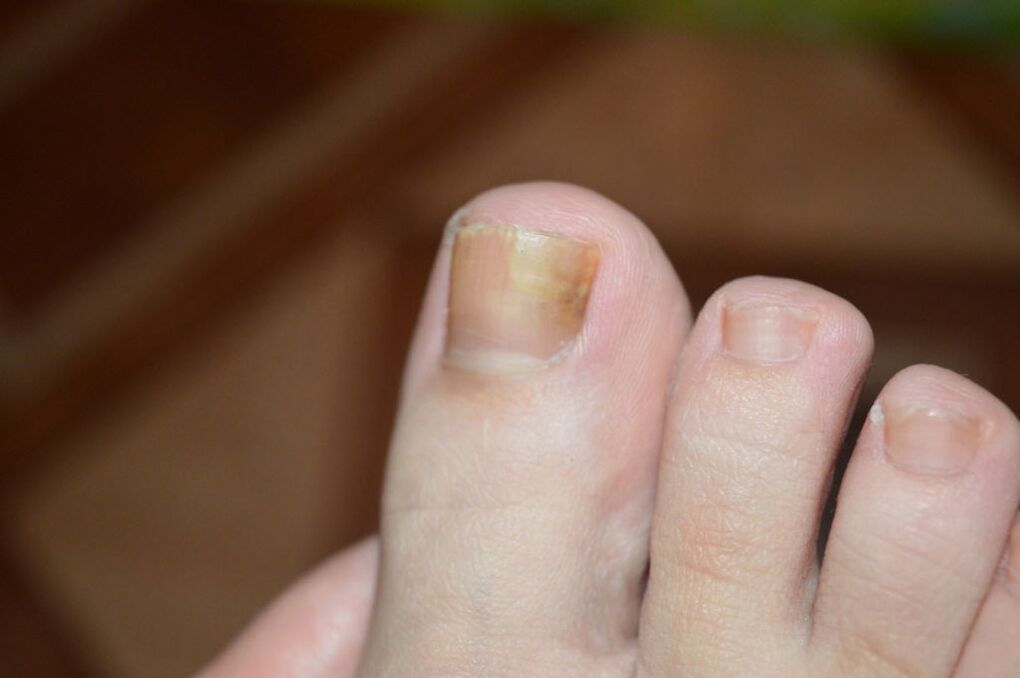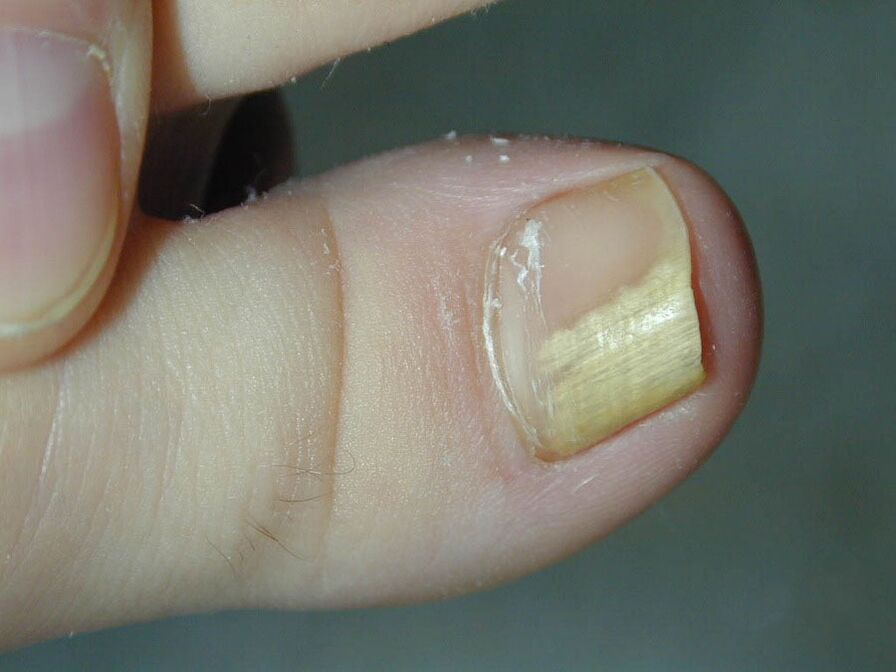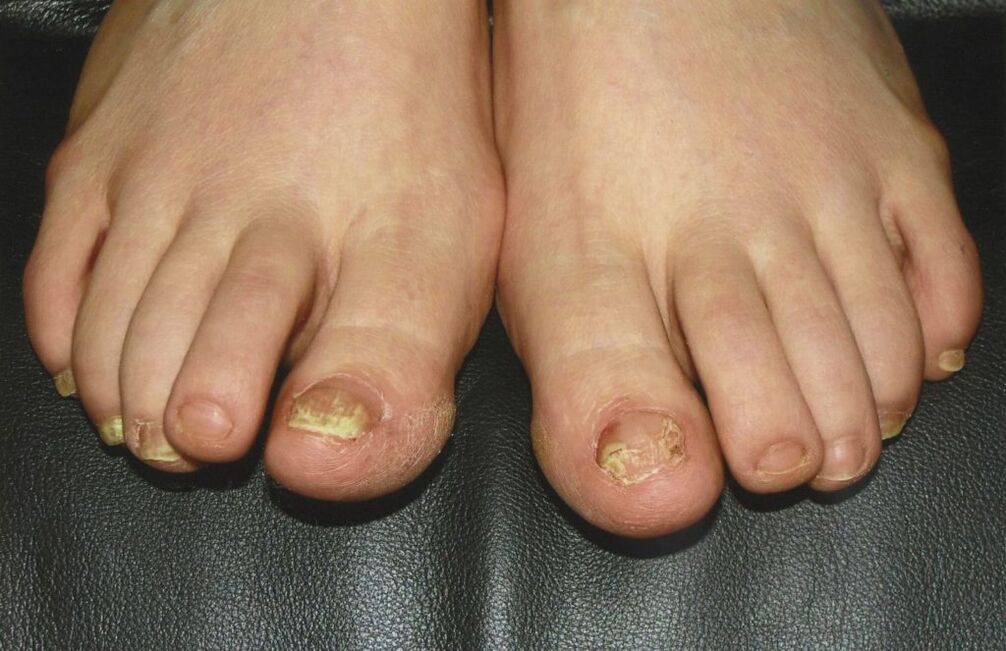
Among the most common dermatological diseases, doctors precisely isolate a fungal infection. Due to the fact that the clinical picture of this disease is poorly expressed, many do not take it seriously. In fact, onychomycosis can lead to the loss of nail plates and even sepsis.
This is the main reason that nail fungus treatment should start at the initial stage. It is extremely important to use special antifungal agents prescribed by a specialist.
The main symptoms of the fungus
The clinical picture of this disease has been very well studied. This makes it possible to easily identify the symptoms of nail fungus on the hands and feet, regardless of its stage.

The main ones are as follows:
- The nail changes color, becomes yellow or green. In certain cases, it may turn white and brown. There are also cases when the nail plate is made of many colors;
- Severe itching is felt on the skin near the nail plates;
- The skin becomes inflamed, redness is noticed on them;
- The nail changes its structure, becomes thicker or becomes thinner;
- Skin to skin;
- Deformation of the nails;
- Nail plates become brittle;
- Detachment of nails.
What does toenail fungus look like and its first symptoms
At first, the disease has no pronounced symptoms, the deformation of the nails during this period is not observed at all.

In the initial stage, nail fungus is manifested by the following symptoms:
- Dry skin;
- Itching;
- The soft tissue around the nails becomes slightly red;
- Light staining of nail plates;
- Nails do not shine, less elastic;
- The emergence of corn.
At this stage of the disease, patients often do not notice changes in the nail plates, due to which they do not seek medical help in a timely manner. This is why it is extremely important to know exactly what nail fungus looks like in order to start therapy as soon as possible. After all, it is during this period that the pathology is easier to treat.
Important!
If we talk about what the fungus looks like on the nails of the hands in the initial stage, then the symptoms are as similar as those that appear when touching the nail plates on the feet.
Methods for diagnosing nail fungus
Quite is quite difficult to diagnose the initial stage of toenail fungus. This will require a number of additional studies. This is mainly due to the fact that the symptoms are poorly expressed.
Among the necessary analyzes, the following are distinguished:
- Clinical blood test. With its help, the specialist receives information if the body's reaction to the inflammatory process caused by microorganisms is observed;
- General urine analysis. Despite the fact that this study will provide information only about the general state of health of the patient, it can also be used to identify concomitant pathologies of the urinary system;
- Examination of nail plate tissue under a microscope. This method manages to determine not only the presence of fungi, but also its variety;
- Blood chemistry.
A dermatologist must accurately decipher the research results. If, at the first signs of illness, a person turns to a therapist, then he will surely in the near future still give a recommendation to a close specialist. After all, it is he who knows what nail fungus on the hands and feet looks like and, accordingly, will be able to diagnose it accurately.
How to treat toenail fungus
Fungal diseases are treated exclusively under the supervision of a physician. Before prescribing a course of therapy, a specialist considers a number of factors:
- Degree of damage to nail plates;
- Form of the disease;
- Skin redness phase;
- The degree of deformation of the nails.
In the stages when onychomycosis has just started to develop, it will be enough to use only local medicines. Special antifungal varnishes, solutions and gels are applied to the affected areas immediately after treatment of the affected nails with a surgical or keratolytic method. After this simple procedure, the medication is better absorbed and, accordingly, the treatment is carried out much faster.
Keratolytics contribute not only to the softening of nail plates, but also to the painless removal of the affected areas. This procedure is performed using conventional patches containing urea or salicylic acid.
The implementation of this patch should be performed according to the following scheme:
- The surface of the nail plates has been carefully cleaned.
- A special composition is applied to the affected nails.
- The mass is sealed with an adhesive plaster.
- The bandage is changed once a day, maximum two.
- Fungus-damaged plaques are cut.
- The antifungal agent is applied immediately.

The patch should be changed daily before going to bed.
There are a number of other effective remedies in the fight against nail fungus.
If the stage of the disease is already significantly advanced, then the specialist may prescribe antifungal drugs, which should be taken orally. The same funds are needed in the early stages, but only if local therapy has not yielded any results.
Important!
You can not prescribe any antifungal medicine. Only a specialist can choose the most effective and safe drug, prevent further development of the disease and the occurrence of relapses.
Preventive measures
Fungal nail infection is an infectious disease. Therefore, to prevent it, certain precautions must be taken:
- Maintain personal hygiene;
- Use only personal items when visiting the pool or spa;
- Do not try someone else’s shoes on an unprotected foot, be sure to wear a sock;
- Be as careful as possible when in contact with a person already infected with the fungus;
- Avoid contact with mycosis infected animals.
Importers It is important to remember that nail fungus is by no means a harmless disease. Its initial stage does not cause anxiety in most. This is why the disease is becoming more common. It is necessary to monitor the condition of nail plates and adjacent tissues, at the first manifestations of the disease, seek help from a specialist.
Since in the early stages this disease is cured very easily. If you run it, then very unpleasant consequences are not excluded.
















